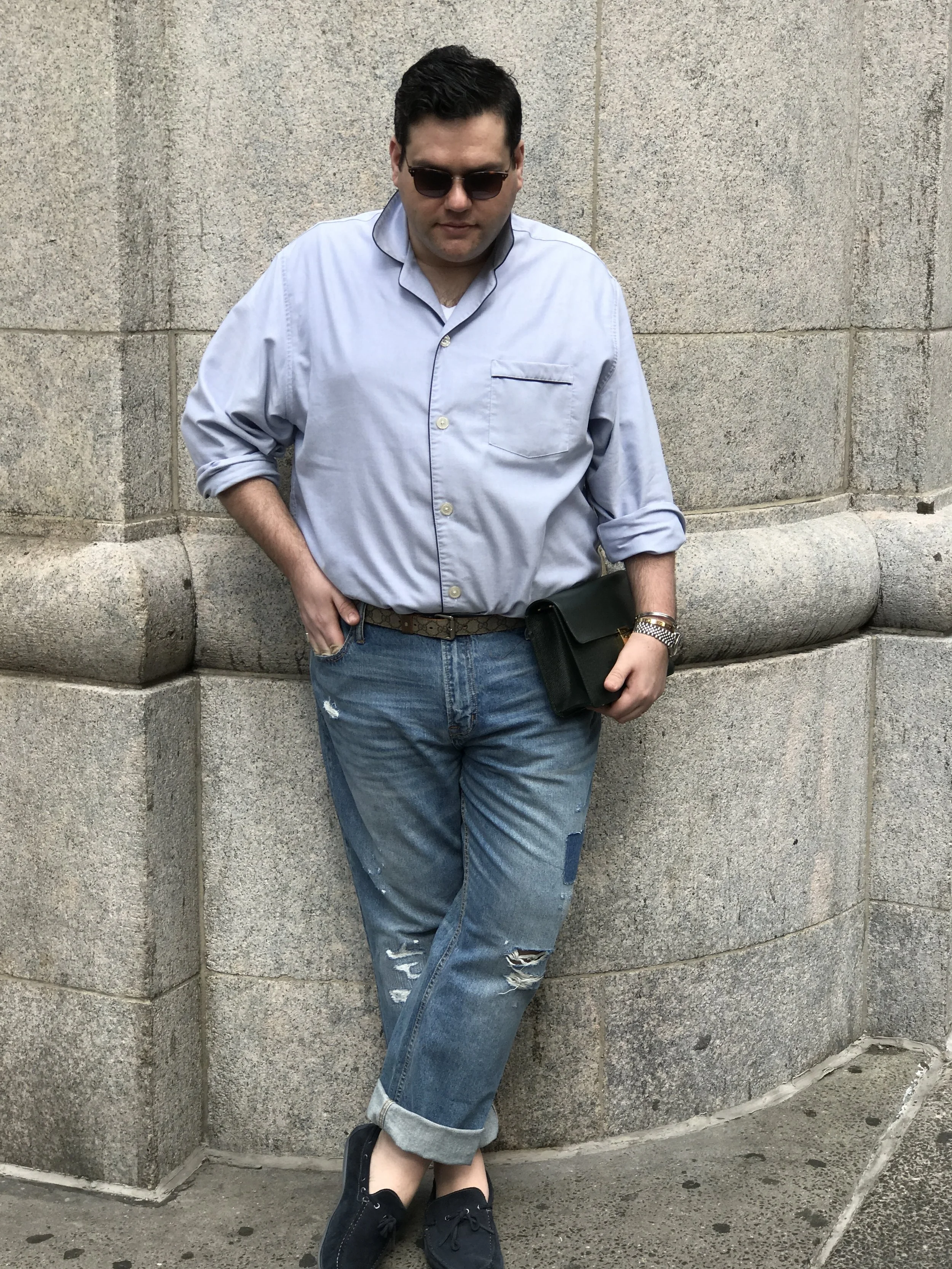Do Men Have a Place in the Body Positivity Movement?
Two years ago, I never would have imagined that I’d be posting shirtless pictures of myself on Instagram. My life-long interest in style led to a career in fashion PR, an industry I worked in for over a decade. But as a man who wears a size XXL, I often felt self-conscious and left out of the fun.
It was during a conversation with my friend Katie Sturino—better known as the body-positive blogger @The12ishStyle and creator of the beauty brand @Megababe—when that changed.
I confessed to Katie that I was as envious of the growing women’s body positivity movement as I was inspired by it. Don't get me wrong: It makes sense that the movement began among women, who have had to cope with society’s unrealistic beauty standards much more prevalently and for—well, forever. But having struggled with self-image, I also knew there were misconceptions that: A, men (especially big men) don’t care about fashion and B, body image issues don’t affect men. I too wanted a place to hear from people with similar experiences and share resources about plus-size fashion—but I felt that kind of platform didn’t really exist for men.
Katie’s solution: “Why don’t you create it?”
Katie Sturino of @The12ishStyle and me
I took her advice and started my Instagram account, @extraextrastyle, which charts my own path toward body positivity through the lens of plus-size men’s fashion. Two years later, almost to the day, I sat down with Katie for this story, to discuss how body image has changed, where men stand in this movement, and a few marriage proposals that have slid into both of our DMs.
Ryan Dziadul: Why did you start @the12ishstyle? Because you’re the reason I started @extraextrastyle.
Katie Sturino: I wanted to see my body type represented and prove to women that you can be stylish at any size. For you, I feel the same way. People assume that men feel fine about themselves. But I’ve seen men freak out about you because you’re looking good and dressing for your body—something men haven’t seen before.
RD: One part of it is service. It’s so hard to shop because most stores don’t carry big and tall clothes, so you have to order online, and you have to order three things knowing that you’re going to return two of them because you don’t know how they’re going to fit. I wanted to make shopping easier by showing what brands and styles worked for my body. The other part is helping people feel better about themselves. The part I wasn’t expecting is how this has helped me feel better about myself. I’ve gotten everything from DMs from people who say they want to marry me to messages from parents whose children are beginning to deal with body image issues who want to thank me for giving them a resource to talk to their kids. Do you feel that men have been excluded from the body positivity conversation?
KS: For a long time, men had been excluded from fashion in general. I’m not saying men have it tough because, let’s face it, men don’t have it tough, but we do underestimate that dudes have bad days too. There are days when men look in the mirror and they feel bad about themselves. That absolutely happens.
RD: Do you remember your first experience with a negative body image? I distinctly remember being in the Sears fitting room in second grade crying because everyone was wearing jeans and there weren’t any in the “husky” department that fit me. I had to wear chinos and felt like such a dork. That’s my first memory of feeling like my body was betraying me.
KS: I was very tall and very big from age 5 on. I was the tallest person in kindergarten, but I didn’t take that as a compliment because it meant that I was different, which wasn’t cool.
RD: Do you think being different is more celebrated now?
KS: Yeah, of course! That’s what social media has done. It simultaneously makes you feel bad about yourself because you don’t have a yacht or a plane while also giving you the opportunity to find your tribe.
RD: What piece of clothing do you feel best in?
KS: A swimsuit.
RD: That’s one piece of clothing many people are most afraid of. Why are you different?
KS: I have struggled with feeling different about my body, but I have always been comfortable without my clothes on. I’m not standing in the mirror criticizing my stomach, my arms, my thighs—I just never have had that.
RD: What would you say to someone who wants to get to that point but isn’t there yet?
KS: One, move towards being body neutral: Rather than looking in the mirror and beating yourself up, you can be like, “I like these shoes I’m wearing” and be out the door. Quit staring in the mirror. But I also think that leading by example is something that’s been helpful. Wear that crop top! We’re in a new age of giving you permission to not feel bad about yourself, and that is hard to shift to mentally.
RD: What brands are doing it right?
KS: Eloquii! They listen to their customers on such a serious level. One of the biggest mistakes that retail makes right now is trying to dress a woman they don’t know. It’s awkward to watch a company be like, “We’re extending our sizes!” but the cut is wrong, the fit is wrong, the model is wrong (like, if they’re using a plus model, they’re using the smallest possible plus model). What are some of your go-to brands? I find it very difficult to shop for men above a 2XL.
RD: You’re telling me. Destination XL carries a lot of brands like Ralph Lauren, Lacoste, Brooks Brothers. Old Navy has pieces that work for me. Land’s End too, and I’m very excited to see what the guys at Good Counsel are up to. You have to get creative: Right now I’m wearing an American Eagle Outfitters shirt. I’m 35 years old and wouldn’t think that America’s favorite teen retailer is where I’d be shopping, but—.
KS: Do you feel a pressure within the gay community to be thin?
RD: That’s a whole other conversation. There is such a narrow window of what is considered acceptable, and I don’t know why. We should be celebrating our differences, especially among a group of people who still get so much hate from outside.
KS: What about in the fashion community?
RD: 100%. I worked for one company in the past where, interviewing candidates, one of the questions afterward was whether they fit the “image” of the brand. Although one boss told me the fact that I was a bigger guy in fashion PR could be helpful for my career because it made me memorable. (I’d like to think my personality didn’t hurt, either!) That may be controversial, but it actually made me feel good.
KS: What is your goal with ExtraExtra?
RD: I’m having fun and I feel like I’m helping drive the conversation about body positivity forward. Maybe a TV show? Are you there, Bravo? It’s me, ExtraExtra!









